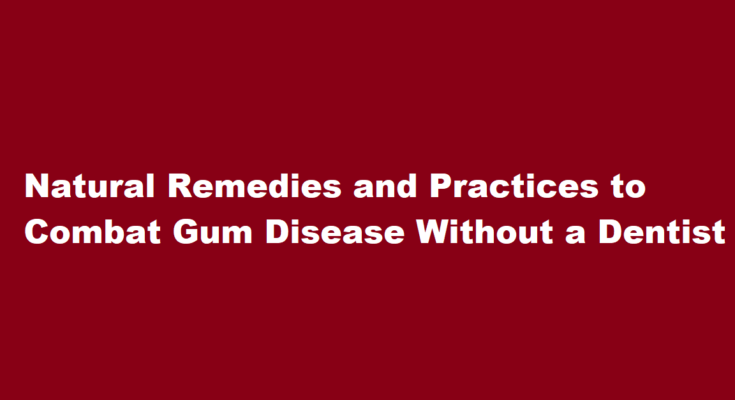Introduction
Gum disease, also known as periodontal disease, is a prevalent oral health issue that affects millions of people worldwide. It can range from mild gum inflammation, known as gingivitis, to severe periodontitis that can lead to tooth loss if left untreated. While consulting a dentist is the most reliable way to address gum disease, there are several steps you can take at home to help prevent, manage, and potentially even cure gum disease without professional intervention. In this article, we will explore natural remedies and practices that can contribute to gum disease improvement.
Maintain Excellent Oral Hygiene
The foundation of preventing and managing gum disease at home starts with excellent oral hygiene practices. This includes
a. Regular Brushing: Brush your teeth at least twice a day using fluoride toothpaste. Make sure to brush for at least two minutes, using gentle, circular motions to clean all surfaces of your teeth.
b. Flossing: Floss daily to remove plaque and food particles between teeth and along the gumline. Proper flossing can prevent the formation of gingivitis.
c. Mouthwash: Rinse with an antiseptic mouthwash containing ingredients like chlorhexidine or hydrogen peroxide. These can help reduce bacterial growth in your mouth.
d. Tongue Cleaning: Use a tongue scraper to remove bacteria and debris from your tongue, as these can contribute to gum disease.
Salt Water Gargle
Salt water is known for its antibacterial properties and can help reduce inflammation and promote healing in the gums. To create a salt water gargle, dissolve half a teaspoon of salt in warm water and swish it around in your mouth for 30 seconds before spitting it out. This can be done several times a day to help alleviate gum discomfort and kill harmful bacteria.
Herbal Remedies
Various herbs and plants have been used for their antibacterial and anti-inflammatory properties to treat gum disease. Some effective herbal remedies include
a. Aloe Vera: Aloe vera gel has soothing properties and can be applied directly to the gums to reduce inflammation.
b. Tea Tree Oil: A diluted tea tree oil solution can be used as a mouthwash. It has antibacterial and anti-inflammatory properties that can help control gum disease.
c. Myrrh: Myrrh can be used in the form of a mouthwash or applied directly to the gums. It possesses antimicrobial properties that may help reduce gum inflammation.
Oil Pulling
Oil pulling is an ancient practice that involves swishing a tablespoon of oil (typically coconut or sesame oil) in your mouth for 15-20 minutes and then spitting it out. This method is thought to help eliminate harmful bacteria, reduce plaque, and improve gum health. Be sure to spit out the oil after use and rinse your mouth with water.
Maintain a Healthy Diet
A balanced diet plays a crucial role in gum health. Ensure your diet is rich in
a. Vitamin C: This vitamin supports gum health and can be found in citrus fruits, strawberries, and leafy greens.
b. Vitamin D: Vitamin D helps with calcium absorption and can promote gum health. Get plenty of sunshine or consider supplements if needed.
c. Antioxidants: Foods high in antioxidants, like berries, green tea, and nuts, can help reduce inflammation and support gum healing.
d. Omega-3 Fatty Acids: Fish, flaxseeds, and walnuts are excellent sources of omega-3 fatty acids, which have anti-inflammatory properties.
Quit Smoking and Limit Alcohol Consumption
Smoking is a significant risk factor for gum disease, and alcohol can contribute to oral health issues as well. Quitting smoking and moderating alcohol consumption can have a positive impact on your gum health.
Stress Management
Stress can weaken the immune system and increase inflammation in the body, making it harder to combat gum disease. Engage in stress-reduction techniques like meditation, yoga, or deep breathing exercises to promote overall health and gum disease improvement.
Regular Exercise
Exercise improves blood circulation, which can help with overall oral health. A healthy body is better equipped to combat infections, including gum disease.
FREQUENTLY ASKED QUESTIONS
Can I treat gum disease on my own?
While there is no home remedy to cure gum disease, patients may want more natural products to help fight the bacteria and reduce inflammation. While many sources claim to help your gums naturally, many lack peer-reviewed research to back those claims.
Can you get rid of gum disease without a dentist?
Brushing twice a day for two minutes each time has a huge impact on your chances of getting gum disease. If you already have the early signs, there are a variety of effective toothpastes that can give you a helping hand. Don’t forget to floss either!
Conclusion
While these home remedies and practices can help manage and even cure gum disease to some extent, it’s essential to remember that they should not replace regular dental check-ups and professional treatment. If you suspect you have gum disease or are experiencing severe symptoms, consult a dentist for a thorough evaluation and treatment plan. Preventive measures, such as maintaining proper oral hygiene, a healthy diet, and a stress-free lifestyle, can complement professional dental care and promote long-term gum health. Combining these natural remedies with dental visits is the best approach to combat gum disease effectively.
Read Also : Mastering The Art of Saying ‘On’ in Spanish – A Comprehensive Guide



